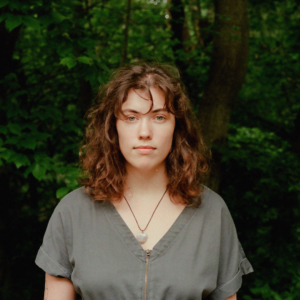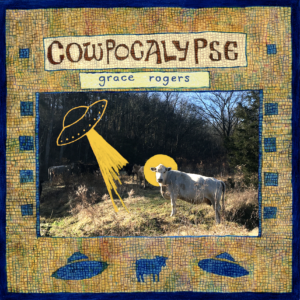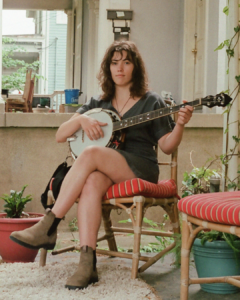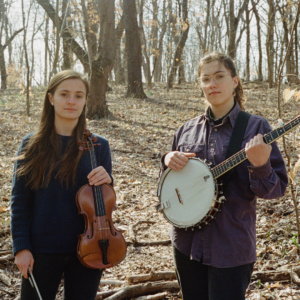
Meet Grace Rogers
 Grace Rogers, 24, of Louisville, is a musician, poet and essayist whose work addresses themes of rural and queer identities, colonialism, class issues, social and environmental justice and rural-urban connections. She was selected as a Firestarter for her original songwriting and poetry that honor her roots in traditional old-time music while probing issues such as environmental degradation, industrial agriculture, rural queerness and climate change.
Grace Rogers, 24, of Louisville, is a musician, poet and essayist whose work addresses themes of rural and queer identities, colonialism, class issues, social and environmental justice and rural-urban connections. She was selected as a Firestarter for her original songwriting and poetry that honor her roots in traditional old-time music while probing issues such as environmental degradation, industrial agriculture, rural queerness and climate change.
Growing up in Owingsville, Grace was part of the eastern Kentucky old time music community. She has been writing songs and playing traditional Kentucky music from a young age. In 2017, she moved to Louisville to attend university, studying English, where she continued in her music and writing. In 2022-2023, she studied east Kentucky banjo styles with John Haywood through an apprenticeship program at the Cowan Creek Mountain Music School. The apprenticeship allowed her to deepen her understanding of east Kentucky playing styles, tunes, and techniques. She will be studying the banjo music of Magoffin County, KY through a fellowship at Berea College this fall.
In January of 2023, she release an EP called “COWPOCALYPSE” that, in Grace’s words, explores the “apocalypse of industrial agriculture, environmental destruction, food apartheid, and floodwaters in Kentucky”.
 Grace said: “It is the polluted water left behind after industrial massacre of the landscape. COWPOCALYPSE is a feeling—namely the feeling of being in north eastern Kentucky in 2019–before the big flood and before COVID, trying to imagine what it might feel like in the future (aka now). COWPOCALYPSE is not dejected, is not anti-agriculture, and is not anti-cow. It is rooted in the undeniable, intuitive feeling that we will hold each other up through what is here and what is coming. And we will do so singing.”
Grace said: “It is the polluted water left behind after industrial massacre of the landscape. COWPOCALYPSE is a feeling—namely the feeling of being in north eastern Kentucky in 2019–before the big flood and before COVID, trying to imagine what it might feel like in the future (aka now). COWPOCALYPSE is not dejected, is not anti-agriculture, and is not anti-cow. It is rooted in the undeniable, intuitive feeling that we will hold each other up through what is here and what is coming. And we will do so singing.”
One of the hallmarks of a Firestarter is bringing fresh perspectives, visions and approaches to intersectional feminism. Grace said: “My work is feminist in so far as it is class-conscious and I am a woman. I write very distinctly from the perspective of a woman and I play traditional music very distinctly from the perspective of a woman. When I moved to Louisville as a non-straight woman from a rural place, I found myself totally stranded in a community of queer women from Louisville with whom I had almost nothing in common. It was a huge wakeup call as a queer person who had few queer friends growing up to be in the community that was finally supposed to make me feel at home, but to feel even more like an alien. This is when it really sunk in that identity is more complicated than a few factors that determine your experiences. It is impossibly complicated to unravel. In my work, I try to pull on these loose threads and tangle them up even more. I am searching for something that transcends the language we have to deal with these problems. That is what liberation looks like to me. I think this mindset is a deep and real form of feminism, because it argues that women are full, dynamic, complicated people.”
One nominator, Nadia Ramlagan, said, “Grace has prioritized inclusivity in traditional music and her original songwriting.”
Another nominator, Arwen Donahue, said, “Grace inhabits a lot of worlds–rural, urban, agrarian and industrial–and a lot of artistic genres, and she moves gracefully between them, weaving them together. I am sure she will be doing vital work for a long time to come.”
 Growing up in rural Kentucky, Grace has a deep respect for rural creative traditions and communities. Several months ago, she organized a concert and square dance to benefit the Cowan Creek Mountain Music School in Whitesburg, which was devastated by last summer’s flood. Her nominator Arwen Donahue said she has made “a tremendous difference to the communities in which she lives and works.”
Growing up in rural Kentucky, Grace has a deep respect for rural creative traditions and communities. Several months ago, she organized a concert and square dance to benefit the Cowan Creek Mountain Music School in Whitesburg, which was devastated by last summer’s flood. Her nominator Arwen Donahue said she has made “a tremendous difference to the communities in which she lives and works.”
In addition to being a musician, Grace is also an excellent poet. She writes and sings with deep feeling, intuition, and intelligence, from a perspective that intersects queerness, reverence for the land, and a fiercely embodied, subtle humor. She writes poetry and non-fiction about female friendship and competition, rural queerness or “outsider” identities in rural spaces.
Grace performs solo shows, and also performs as part of an old-time singer-songwriter duo, with fiddler Blakeley Burger.
In response to being nominated Grace said, “I’m very honored. I’m moved that the people who nominated me, Arwen and Nadia, did so. They are two of the sharpest and most astonishing artists that I know and are both mentors to me in a similarly gentle way that is very quietly life-changing. There is nothing more important to me than intergenerational artistic relationships and the feeling of mutual support and excitement. Women uplifting each other is a powerful thing and the fact that we have an organization like KFW in this state that facilitates these relationships is a true gift to our community.”
You can learn more about Grace, hear some of her music and find some of her writing at


